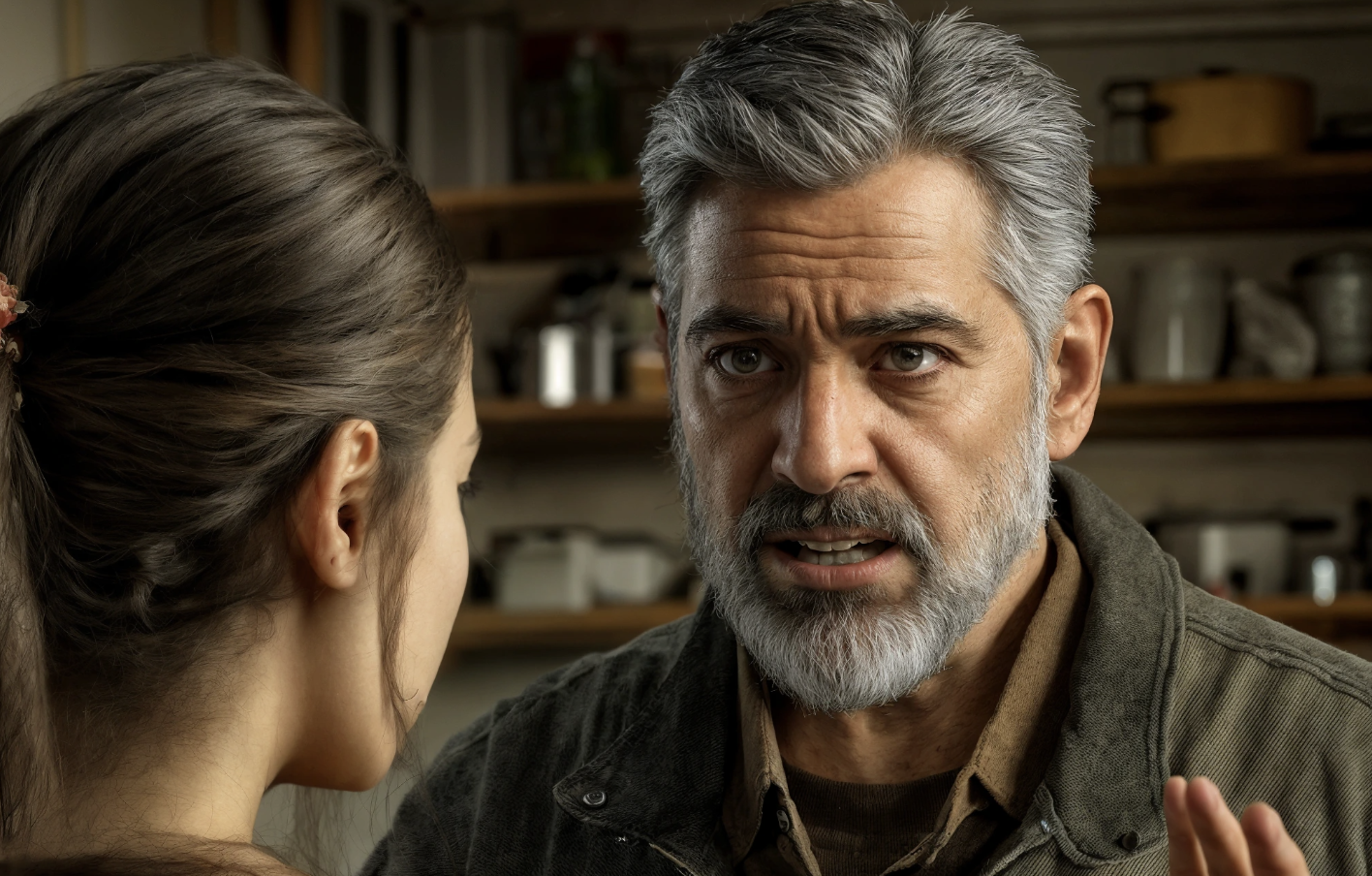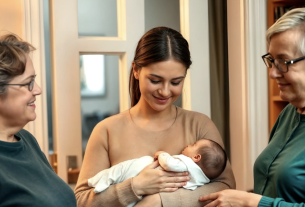Vika was looking at her phone screen, trying not to lose focus. Just five minutes ago, life was going on as usual — an ordinary Tuesday, a work meeting via video call, the quarterly report. And suddenly, her husband burst into the room like a whirlwind — Anton, who was supposed to return from work in three hours.
“The family’s coming from the village! The table should be overflowing, and there better be plenty of meat, got it?! Not like last time!” Anton declared without even saying hello.
Vika took a deep breath and automatically muted the phone. Her colleague was still talking about charts and figures in the earphone, but Vika wasn’t listening anymore. In her head, flashes from the past quickly appeared — a procession of faces, a table piled with food, mountains of dirty dishes, unspoken reproaches, and meaningful looks.
“What do you mean ‘coming’?” Vika asked cautiously. “When? And who exactly?”
Anton stood by the door with his arms crossed. His face showed the importance of the moment, as if it weren’t relatives visiting but the president paying an official visit.
“They’re arriving on Friday. Mom, Aunt Galya, Boris with his wife and kids. Maybe others will come too,” Anton shrugged. “What difference does it make? We’ll fit everyone in.”
“Fit everyone” meant in their two-room apartment. Vika knew arguing was useless. Her husband’s relatives considered it perfectly natural to stay with them during visits to the city. “Why spend money on a hotel when you can stay with family?”
“Sergey, sorry, I have to disconnect. Family matters,” Vika quickly said into the phone and ended the call.
Last year’s visit was still fresh in Vika’s memory. She had prepared for three days: cleaned the apartment until it shone, bought groceries for a small army, made five kinds of salads, two types of meat dishes, fish, and desserts. She slept only four hours a night to get everything done. Then, after the relatives left, she accidentally overheard her mother-in-law on the phone: “Yes, they stayed over. Only they fed us rather modestly. And they have plenty of money in the city; they could have put more effort in.”
“Anton, I have work,” Vika tried to keep her voice firm. “I can’t take time off to prepare for your relatives’ visit.”
“You always say that,” Anton waved her off. “But you always manage everything anyway. What’s so hard about going to the store and cooking? Don’t exaggerate. You’re not building a nuclear reactor.”
Vika closed her eyes and counted to five. It was pointless to explain to her husband that “going to the store and cooking” for nine people wasn’t a ten-minute task. Anton had never cooked more than fried eggs for himself and genuinely thought everything else happened by magic.
“Last time your mom said there wasn’t enough food,” Vika reminded him. “Even though I cooked for three days and spent half my bonus on groceries.”
“Oh, stop nitpicking!” Anton drummed his fingers on the doorframe. “Mom just wanted more meat. You know, in the village, lunch without meat isn’t lunch.”
Vika knew that well. And she knew that despite their meat-loving habits, not a single person from the village ever brought even a kilo of minced meat. But they did take home everything left after the feast — from uneaten cake to half-drunk juice.
“We’ll go shopping tonight, stock up,” Anton continued. “I’ll help you.”
Vika also remembered Anton’s “help.” Last time, he threw three bags of chips and some beer into the cart and then left, saying he urgently had to meet a friend. Of course, Vika paid.
“I won’t be able to tonight,” Vika shook her head. “My project is on fire, and Sergey is waiting for the report.”
“Your projects are always on fire!” Anton exploded. “Are you a wife or a workaholic? The family comes once a year, can’t you put your spreadsheets aside?”
The “spreadsheets” brought seventy percent of the family income. Anton’s job at the auto service was paid irregularly, and he worked, frankly, without much enthusiasm. But the fact that Vika was the main breadwinner didn’t bother Anton. Judging by conversations, he presented it to his family as if he supported his wife, letting her “play with those computers.”
Vika got up from the table and went to the window. April had just begun, but the trees were already covered with barely noticeable green. Last year, the relatives also came in spring — then they stayed a whole week. Seven days of chaos, constant cooking, running to stores, laundry, cleaning. And no gratitude.
Anton Borisovich and Vera Pavlovna (father-in-law and mother-in-law) slept in the bedroom, Aunt Galya on a folding bed in the corridor, Boris with his wife and kids in the living room on the sofa. Vika and Anton themselves slept on the floor in the living room, next to the nieces and nephews who had a habit of sleepwalking and stepping on Vika’s hair.
The kids, by the way, were completely uncontrollable. Last visit, they broke Vika’s favorite vase and broke the bathroom faucet. Boris just laughed: “Kids will be kids! Always restless!” And didn’t think of compensating for the damage.
Vika still remembered what the apartment looked like after they left — as if a tornado had passed through. Stains on the sofa, crumbs in the bed, dirty marks on the light carpet, clogged sink. Anton just waved his hand: “Clean up and it’ll be like new.”
“Vik, don’t sulk,” Anton’s voice softened. “You know it’s important for Mom that everything is top-notch. She tells the whole village how we live here. Don’t embarrass me.”
So that was it. Not “let’s make Mom happy with a delicious dinner,” but “don’t embarrass me.” As if the relatives’ visit was an exam for Vika, which she had to pass with honors, or else a “fail” on her record.
“How long are they planning to stay?” Vika tried to speak calmly.
“As usual. A week or two,” Anton shrugged. “Why are you so tense? We managed last time.”
A week or two. Meaning seven to fourteen days without personal space, no chance to work properly, no rest. Two weeks of cooking, cleaning, laundry. All that against a backdrop of deadlines at work.
“I can’t take vacation,” Vika said firmly. “And I’m not sleeping on the floor for two weeks either.”
“Where are we supposed to sleep?” Anton was surprised. “We can’t send the family to a hotel!”
“Why not?” Vika replied just as calmly. “Your mom and Aunt Galya can stay with us, and Boris’s family in a hotel.”
Anton looked at Vika as if she were a traitor to the motherland.
“What are you saying? A hotel? They have three kids!”
“We have a two-room apartment,” Vika reminded him. “How do you imagine fitting nine people? It’s not realistic.”
“We fit last time, and we’ll fit this time,” Anton cut her off. “That’s it, the conversation’s over. Your job is to make sure the table is overflowing with food.”
A familiar picture. Anton gives orders, and Vika must carry them out. As usual, the only thing expected from the husband was to look important and meet the relatives at the station. Everything else was the wife’s responsibility.
“What if I can’t manage?” Vika suddenly asked. “If I don’t have time to cook?”
Anton looked at his wife in disbelief.
“Then I’ll be very disappointed,” he cut in. “And Mom will be too. I don’t understand why you’re even starting these pointless talks? You always managed before, and now suddenly ‘I can’t.’ Pull yourself together! And make a grocery list — we’ll go shopping tonight.”
Saying that, Anton turned and left the room. The conversation was over — the husband had made all the decisions. Vika was alone again, now with a pile of problems to solve in the remaining three days.
The phone rang — it was Sergey, her boss, calling back. The project really was urgent, and the report was needed yesterday. Vika looked around, as if seeing her apartment for the first time. Small, cozy, but completely unsuitable for hosting so many people.
Every time the relatives left, Vika promised herself she wouldn’t let it happen again. And every time that promise was broken — as soon as Anton declared, “The family’s coming.”
But today something had changed. Maybe it was her husband’s tone — commanding, intolerant of objections. Or how easily he brushed off her work, calling it “spreadsheets.” Or that “don’t embarrass me,” which sounded like a reproach.
Vika remembered how after last year’s visit she spent two weeks with migraines — from fatigue and lack of sleep. How she spent her bonus on groceries instead of buying herself the promised jacket. How Uncle Boris casually remarked while piling his third plate of salad: “You’re well set up here — eat, drink, have fun, no need to work.”
And suddenly she understood: enough.
Vika unlocked her phone to call her boss back, but instead opened a browser and typed into the search bar: “What to do if your husband treats you like domestic help.” The list of articles flashed headlines like: “How to stop being the housemaid in your own family,” “Family slavery: when it’s time to sound the alarm,” “10 signs you’re being used.”
It felt like an awakening — when you suddenly realize that what seemed normal is actually not normal at all.
Vika closed the browser and dialed her friend.
“Katya, hi. Listen, remember you said I could stay with you if needed? Looks like I need that.”
Vika didn’t yet know exactly what she would do. But one thing was clear: this time, everything would be different.
In the evening, when Anton came home with two bags of groceries (chips, soda, sausages), Vika greeted him with a smile.
“Alright. Everything will be done,” Vika nodded in response to her husband’s next orders on what dishes to prepare.
Anton nodded contentedly, threw the bags on the table, and went to the room to watch football. The job was done — he contributed. Now it was Vika’s turn.
While her husband enthusiastically commented on the match, Vika took a small backpack from the closet and carefully packed several sets of clothes, chargers, cosmetics. She put her passport and wallet in the side pocket. Then she hid the backpack in the storage room.
The next morning, Anton woke to the sound of running water — Vika was taking a shower. When his wife came out of the bathroom, Anton raised himself on his elbow in surprise: Vika was dressed not in a bathrobe but in a business suit.
“Where are you going?” Anton asked in disbelief.
Vika buttoned her jacket, looking in the mirror.
“I was urgently called on a business trip. I’m leaving for two days,” Vika calmly answered, pulling the already packed backpack out of the storage room.
“What business trip?!” Anton even sat up on the bed. “Are you crazy? The family arrives tomorrow!”
“I know,” Vika checked her purse. “But work is work.”
“Cancel your trip!” Anton jumped up. “Immediately! You can’t leave now!”
“I can’t cancel,” Vika shrugged. “Sergey said it’s urgent. The future of the whole project depends on this trip.”
Anton frowned, looking at his wife’s backpack.
“Why don’t you have a business briefcase, but this…” — the husband faltered, choosing his words — “tourist backpack?”
“It’s more convenient for carrying my laptop and documents,” Vika answered without blinking. “Alright, I have to go. The taxi’s already waiting.”
“Vika, wait!” Anton grabbed his wife by the sleeve. “You can’t do this. What will I tell my mom? How am I going to cook for everyone?”
“I’m sure you’ll manage,” Vika gently freed her arm. “After all, what’s so hard about going to the store and cooking? You said so yourself yesterday.”
Anton opened his mouth but couldn’t find words. Vika took advantage of the moment and slipped into the hallway.
“I’ll call when I arrive,” she called over her shoulder and closed the door behind her.
The taxi was really waiting — Vika had ordered it in advance. But instead of the airport or train station, the car took her to a quiet district on the other side of the city, where Katya, Vika’s friend from university, lived in a cozy three-room apartment.
“How long are you planning to hide with me?” Katya asked, helping Vika settle into the guest room.
“A couple of days,” Vika took out her laptop. “I want them to feel at least once what it’s like to cook and clean up after everyone.”
“Hard to believe your Anton will cook,” Katya snorted.
“We’ll see,” Vika turned on the laptop. “I really have to finish the project. So I’ll work here for two days, if you don’t mind.”
By lunchtime, Vika’s phone started ringing off the hook. Anton called every fifteen minutes. Vika muted it and kept working.
Only in the evening, when Katya brought her a cup of tea, did Vika decide to check messages. Ten missed calls from Anton, three from her mother-in-law.
“Where are you?” read the first message from her husband. “Vika, call back immediately!” the second. “They’ve arrived!” the third, sent two hours ago.
Vika dialed Anton’s number. He answered on the first ring.
“Where are you?” her husband’s voice sounded both surprised and irritated.
“On a business trip, I told you,” Vika replied calmly. “How are things at home?”
“How are things?!” Anton almost shouted. “Mom and Aunt Galya arrived five hours ago! Boris and his family are here too! And there’s only eggs, a carton of milk, and half a jar of jam in the fridge!”
“What about the groceries you bought yesterday?” Vika innocently asked.
“Chips?! Are you kidding me?” Anton’s voice sounded genuine despair. “Mom is asking where you are and when dinner will be!”
“Tell her I’m on a business trip,” Vika suggested. “As for dinner… well, what’s so hard about going to the store and cooking? Don’t exaggerate. You’re not building a nuclear reactor.”
Silence hung on the line. Anton seemed to recognize his own words.
“You did this on purpose,” the husband finally said. Not a question — a statement.
“I have to go,” Vika said. “Work doesn’t wait.”
“Vika! Don’t you dare hang up!”
“Bye, Anton. Manage on your own,” Vika ended the call.
The rest of the evening passed quietly. Vika finished the project, sent the report to Sergey, and even allowed herself a glass of wine. She didn’t check the phone again — decided she’d had enough nerves for one day.
The next morning, Vika woke rested and surprisingly calm. For the first time in a long time, she didn’t have to get up at the crack of dawn to make breakfast for her husband or run to the store for groceries.
“How did you sleep at the new place?” Katya set a cup of coffee in front of her friend.
“Great,” Vika smiled. “I haven’t slept this well in ages.”
By lunchtime, Vika still decided to check her phone. No new messages, but she found fresh photos posted by Boris on social media. In the pictures, the relatives sat around a sparsely set table in Vika and Anton’s apartment. In the background, a mountain of dirty dishes was visible.
“Came to bro’s city,” the caption read, “Not much hospitality this time.”
Vika smiled. In the comments under the photo, there was a message from her mother-in-law: “Daughter-in-law has completely lost control — went on a business trip! Anton is doing what he can, but a man can’t handle all the chores!”
That evening Anton called again. His voice sounded tired and defeated.
“Vika, when are you coming back?”
“Tomorrow, as planned,” Vika answered. “How are you all?”
“Terrible,” Anton admitted honestly. “Mom is unhappy, Boris’s kids wrecked the apartment, I can’t keep up with cooking and cleaning at the same time.”
“Sorry to hear that,” Vika said. “Must be hard.”
“Are you kidding?” bitterness crept into her husband’s voice.
“No, just interested,” Vika tried to stay calm. “You said ‘messing about in the kitchen’ is so easy.”
“Vika, enough,” Anton sighed. “I get what you mean. I was wrong. Cooking for nine people is hellish work.”
Vika was silent, letting her husband continue.
“And you know what’s the worst?” Anton went on. “No one even said thanks. Mom just grumbles that ‘it’s not like before,’ and Boris and the kids behave like they’re in a restaurant — they just demand and don’t clean up after themselves.”
“Really,” Vika tried to hide her glee. “Who would have thought.”
“Alright, I deserved that,” Anton admitted. “Come back soon, okay?”
“I’ll be back tomorrow,” Vika promised. “As agreed.”
When Vika returned home the next day, the apartment looked as if a hurricane had passed through. Dirty dishes piled in the sink, crumbs scattered on the floor, mysterious stains decorated the sofa.
“Where is everyone?” Vika asked, looking at the battlefield.
“They left,” Anton sat in the kitchen, holding his head in his hands. “They packed up and left this morning. Mom said she needed to visit a neighbor. Boris said the kids are bored in the city.”
“Got it,” Vika put down her backpack.
“Mom is very unhappy with you,” Anton reported.
“I’ll survive,” Vika shrugged.
Anton looked at his wife for a long time, then suddenly laughed.
“You know, I saw for the first time what it’s like to be in your shoes. It’s… not easy.”
“Yes,” Vika agreed. “Not easy.”
“I didn’t realize how much you do during their visits,” Anton admitted. “Sorry.”
Vika approached her husband and put her hand on his shoulder.
“It’s okay. The important thing is you understand now.”
A year passed. One evening, Anton came home from work and said:
“Mom called. She says they want to come next week.”
Vika tensed, preparing for another round of battles, but Anton unexpectedly added:
“Maybe no guests this year? I told her we’d come to them for the weekend. Stay a day or two and come back. That’d be better for everyone.”
Vika smiled. After that memorable visit, the family never came “unexpectedly” again. And Anton changed too — he began to notice how much effort it took to keep the house in order.
Sometimes the most effective lesson is simply to let people walk in your shoes, even if just for a couple of days.



